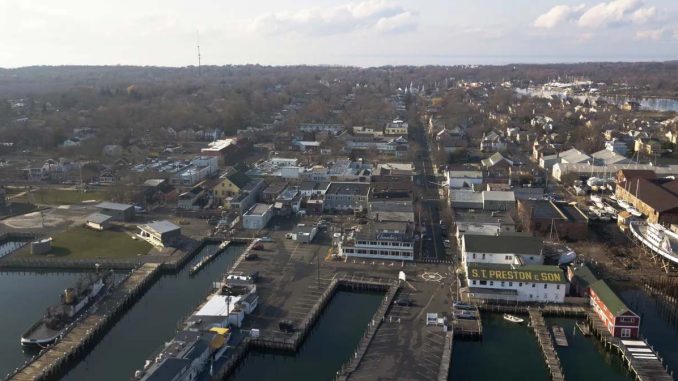
Greenport trustees may expand the Commercial Retail district in the village instead of establishing a new waterfront zone, after a work session discussion last Thursday. The village plans to schedule a public hearing after Thursday’s meeting, where more details will be released.
At their Aug. 4 meeting, board members discussed moving forward with legislation to divide waterfront areas into two separate districts. These would distinguish Waterfront Commercial properties, which have access to the water, from others that just have views of the water. The proposed new waterfront access zone would not include hotels, motels and restaurants as permitted uses.
Mayor George Hubbard Jr. argued last Thursday that shifting the “view-only” properties into the existing Commercial Retail zone would be easier than creating an entirely new zoning district specifically for them. “Keep the waterfront separate, take the other [properties] that are on the inside of Front Street and everything else, make them Commercial Retail across the street, and we don’t need a new water view zone or anything else,” Mr. Hubbard said.
“We’re not creating a new [zone,] we’re just bringing the other side of the street into the zoning map that we already have,” he added. It would be simpler than creating a third zone, he said, and the board can clarify permitted uses.
Most trustees favored pursuing separate legislation for two purposes: One measure to redistrict and another to alter permitted uses within specific districts.
“I think it’s really a lot simpler to get consensus when we break these larger ideas up into smaller, bite-sized pieces,” deputy mayor Jack Martilotta said. “If we’re just going to change it from Waterfront Commercial to Commercial Retail, I think it’s a relatively simple lift. I think we can get everybody behind it. I think it’s something we can accomplish in a reasonable amount of time, which would then free us up to have a secondary discussion of what uses do we want in this area.”
Mr. Hubbard said he wants board consensus before legislation moves to a public hearing so they “can present a united front.”
“The fact that we’re suggesting moving forward with a zoning classification change, ahead of a usage change, doesn’t disturb me. I think doing them sequentially, rather than all at once is a step in the right direction,” Trustee Peter Clarke said.
Trustee Mary Bess Phillips, although she said she wants to prioritize moving forward, expressed concern about tackling permitted uses separately and said she doesn’t think more hotels or motels would fit in downtown Greenport. She has previously emphasized the importance of protecting a working waterfront and shifting development to prioritize year-round residents.
“I just feel that — hotels, motels — we are getting away from looking at creating a business district that is for year-round residents and not just for the tourist season,” she said. “The restaurants are fine. What I’m concerned about is that we have properties that could potentially be used better for housing, making a community that is a year-round community and not one that’s based on tourist activity continuously.”
Aside from the Greenporter, she added, the hospitality industry doesn’t usually do well in the winter.
“Maybe we just want to go back to having a little bit of a step back from being jam crammed all summer long,” she said. “I just think that it’s time to rethink who we want to be and what we want to look like. And I’m concerned about hotels, motels being in the downtown. Waterfront, definitely, it needs to be out. But I think we really need to rethink either the size that goes in for a hotel, motel, the amount of rooms, I think we need to discuss it.”
Trustee Julia Robins pointed out that’s where discussion about a moratorium started. The board did not discuss setting one at last Thursday’s work session.
“Six months ago, we started to become alarmed that this village seems to be bursting at the seams with people wanting to come here and create more businesses that are going to create more strain on infrastructure, that we don’t have the services to deal with it. We’re in the midst of having a housing crisis, we don’t have people that can afford to live here anymore. So there’s multiple tiers of things going on,” she said.
At the work session, village attorney Joseph Prokop also presented new drafts for a parking law with a sliding fee structure and legislation that would facilitate more accessory dwelling units based on the transcript of a special Aug. 4 trustee meeting. The suggested pieces of legislation would interact with each other when code is written.

